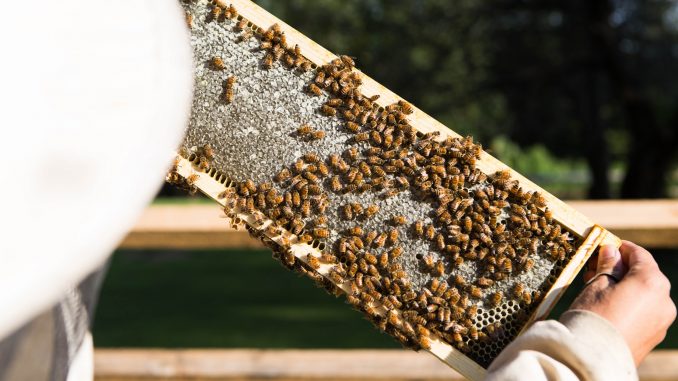
Before tending to about 500,000 honeybees, Sam Torres ignites a clump of paper kindling inside his hand-held bee smoker. He then squeezes the bellows until smoke begins to stream from the nozzle. The smoke, Torres said, masks the bees’ alarm pheromones, preventing the colony from signaling to one another to defend the hive.
While this precaution may suggest to some that bees are aggressive animals, Torres said he has dedicated his career to proving this popular assumption false.
“My main goal in life is to take away the stigma that everyone has of bees and being stung,” said Torres, a 2014 horticulture alumnus. “It’s just this idea that we have that they’re just these creatures that want to kill us.”
Torres, owner of the honey company Keystone Colonies Beekeeping, will convey this message in his educational talk, “So You Want to Be a Beekeeper?” at the eighth annual Philadelphia Honey Festival on Sunday.
Founded in 2010, the three-day festival promotes the work of Philadelphia beekeepers and honey producers, in addition to raising awareness about bees’ environmental significance.
Torres will speak at Bartram’s Garden in southwest Philadelphia at 1 p.m. during the festival’s last day. His bee products, which include raw honey and beeswax candles, will also be available for purchase.
Torres maintains an apiary, or collection, of 12 hives at Glen Foerd, a public waterfront park in East Torresdale, where he also works as a horticulturalist. Each hive consists of several rectangular frames slotted into a small wooden box. His thousands of bees live inside the honeycomb grids of each frame, with a single hive producing up to 100 pounds of honey per year, he said.
On Thursday at 5:30 p.m., members of the Philadelphia Beekeepers Guild, the educational nonprofit organizing the festival, will conduct a demonstration of one of Torres’ bee colonies at Glen Foerd, the site of the festival’s first day.
During his Sunday presentation at Bartram’s Garden, he plans to teach attendees the basics of how to purchase and manage a bee colony. Though he considers it a fulfilling activity, Torres said maintaining beehives is an intensive process that requires switching between several different roles.
For example, each time he enters a hive he acts as a “detective.” He carefully examines the honeycomb, the hexagonal structure containing the brood — a group of bees in the early stages of life — and stores of pollen and honey, looking for any signs of disease.
“If I find something wrong, then I have to diagnose it, I have to be the doctor,” Torres said. “Then I kind of have to be the nurse and treat that situation.”
Though Torres said interest in locally produced honey has greatly increased over the last few years, he added that most consumers still know very little about how their food is cultivated.
“I’d say there’s a huge disconnect between urban life and natural consciousness,” Torres said.
His desire to teach people about the agricultural process drives Torres’ educational programming, he said. This summer, he taught a series of workshops on beekeeping at Glen Foerd. He also ran educational programs and conducted honey tastings at a farm on 8th and Poplar streets run by Teens 4 Good, a youth urban farming organization in Philadelphia.
Like the young students he teaches at the farm, Torres grew up in Philadelphia without access to many sources of nature.
“I think that the lack of green space in Philly is what always drew me to wooded areas,” Torres said. “I’ve always felt like I was in a concrete jungle.”
Following his passion to college, Torres spent much of his time at Temple in the greenery of Ambler Campus, which is home to the horticulture program. But even as he studied the natural world through his botany and chemistry courses, beekeeping was not a part of the curriculum.
Each time he passed the campus apiary he felt intrigued, but didn’t feel like he had a gateway to approach the subject, he said. Then, in his third year, Torres finally received an invitation.
“One day, someone I had class with was like, ‘Hey, do you wanna come check out the beehives?’ and I was like, ‘That’s so awesome, I’ve always wanted to,’” Torres said. “I fell in love. I was just hooked.”
Despite discovering his new interest, Torres found there were no beekeeping classes offered at the time, and he signed a petition to start a course. The following year, he enrolled in Introduction To Beekeeping.
His instructor for the class, Vincent Aloyo, recently joined Torres at the University of Delaware for the annual Eastern Apicultural Society conference. Aloyo, an adjunct horticulture instructor, said Torres was one of his most enthusiastic students.
“When he finished [his final exam], he said, ‘This is the best course I have ever taken!’” Aloyo said. “So I knew he was a beekeeper.”


Be the first to comment